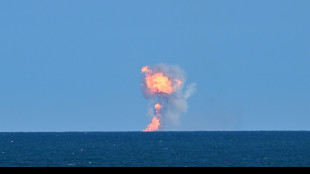
-
 N. Korea's latest weapon? Bombarding South with noise
N. Korea's latest weapon? Bombarding South with noise
-
'Kidnapped' Uganda opposition figure Besigye to appear at military court: lawyer

-
 Asian markets fluctuate as traders weigh geopolitical tensions
Asian markets fluctuate as traders weigh geopolitical tensions
-
'An inauspicious day': the landmines ruining Myanmar lives

-
 UN to vote again on Gaza ceasefire, US plans unclear
UN to vote again on Gaza ceasefire, US plans unclear
-
Japan's manga powerhouse 'Dragon Ball' turns 40

-
 Japanese, Koreans bottom of global love life survey
Japanese, Koreans bottom of global love life survey
-
Son blames 'mistakes' after South Korea held by Palestine in qualifier

-
 Japan ramps up tech ambitions with $65 bn for AI, chips
Japan ramps up tech ambitions with $65 bn for AI, chips
-
Lights, action, melodrama! Silent films get new reel at London haven

-
 Myanmar led world in landmine victims in 2023: monitor
Myanmar led world in landmine victims in 2023: monitor
-
ICC to sentence Timbuktu war criminal

-
 Ugandan opposition figure Besigye 'kidnapped', says wife
Ugandan opposition figure Besigye 'kidnapped', says wife
-
Australia's Jason Day eyes more major glory after resurgence

-
 Machu Picchu security boosted after visitors spread human ashes
Machu Picchu security boosted after visitors spread human ashes
-
Popovic hails Australia character in 'crazy' World Cup qualifier

-
 Taliban govt clearing 'un-Islamic' books from Afghanistan shelves
Taliban govt clearing 'un-Islamic' books from Afghanistan shelves
-
Argentina beat Peru as Uruguay hold Brazil

-
 Asian markets struggle as traders weigh geopolitical tensions
Asian markets struggle as traders weigh geopolitical tensions
-
Tatum stars as Celtics end Cavaliers unbeaten start

-
 Hurting India under pressure in blockbuster five-Test Australia series
Hurting India under pressure in blockbuster five-Test Australia series
-
'They killed her dream': Israel strike leaves woman footballer in coma

-
 Iraq holds its first census in nearly 40 years
Iraq holds its first census in nearly 40 years
-
Iraqis face tough homecoming a decade after IS rampage

-
 Russian net tightens around last civilians left in eastern Ukraine
Russian net tightens around last civilians left in eastern Ukraine
-
Olympic champion Tebogo aims to inspire next generation of African athletes

-
 Valencia on target as ten-man Ecuador upset Colombia
Valencia on target as ten-man Ecuador upset Colombia
-
'Rust' to premiere three years after on-set shooting

-
 Strike at French cognac maker Hennessy over measures in China spat
Strike at French cognac maker Hennessy over measures in China spat
-
Xi, Lula meet in Brasilia to 'enhance ties'

-
 SpaceX fails to repeat Starship booster catch, as Trump watches on
SpaceX fails to repeat Starship booster catch, as Trump watches on
-
'I have left a legacy': Nadal retires from tennis

-
 US recognizes Venezuela opposition's Gonzalez Urrutia as 'president-elect'
US recognizes Venezuela opposition's Gonzalez Urrutia as 'president-elect'
-
European powers, US seek to censure Iran at UN nuclear watchdog board

-
 UNAIDS chief says husband, Ugandan opposition figure Besigye, 'kidnapped'
UNAIDS chief says husband, Ugandan opposition figure Besigye, 'kidnapped'
-
Nadal's sensational career ends as Netherlands defeat Spain in Davis Cup

-
 US announces talks with Israel over civilian casualties in Gaza
US announces talks with Israel over civilian casualties in Gaza
-
SpaceX fails to repeat Starship booster catch, as Trump looks on

-
 G20 summit ends with Ukraine blame game
G20 summit ends with Ukraine blame game
-
Trump appoints TV celebrity 'Dr. Oz' to key US health post

-
 European stocks fall on Ukraine-Russia fears, US focused on earnings
European stocks fall on Ukraine-Russia fears, US focused on earnings
-
Last-gasp Szoboszlai penalty rescues Hungary draw with Germany

-
 Germany, Netherlands draw as Nations League group stage ends
Germany, Netherlands draw as Nations League group stage ends
-
Hong Kong tycoon Jimmy Lai takes witness stand in collusion trial

-
 Guardiola set to extend stay as Man City boss - reports
Guardiola set to extend stay as Man City boss - reports
-
Minnows Botswana hold Egypt to qualify with Mozambique, Tanzania

-
 Inter Miami coach Martino leaving club for 'personal reasons' - club source
Inter Miami coach Martino leaving club for 'personal reasons' - club source
-
Chinese man sentenced to 20 months for Falun Gong harassment in US

-
 Hong Kong court jails 45 democracy campaigners, drawing condemnation
Hong Kong court jails 45 democracy campaigners, drawing condemnation
-
'I did it for Rafa': Alcaraz after keeping Spain Davis Cup dream alive


Russian offensive inspires golden age of military bloggers
Before Russia's offensive in Ukraine, Mikhail Zvinchuk's Telegram channel was mainly known to military buffs. Today, it boasts more than a million followers, exceeding that of many media outlets.
Numerous Russian military bloggers like him have gone from obscurity to celebrity since the start of the conflict, distinguishing themselves by being more outspoken than traditional media under strict government control.
They publish information before the government does, and criticise some of its decisions.
To some, this makes them more credible than Russian authorities -- at the risk of ruffling feathers.
When Russia launched its offensive on February 24, 2022, "the (official) institutions in charge of information were thrown into turmoil," said Zvinchuk, whose Telegram account is called Rybar, or fisherman in Russian.
"Officials couldn't agree on which narratives to release to the public," the 31-year-old told AFP.
So "we rose to defend our motherland in the world of information. We became its shield."
A military interpreter by training, Zvinchuk was decorated for his missions in Syria and Iraq and once worked for the Russian defence ministry's press service.
The Arabic and English speaker publishes on Telegram in several languages.
He has a staff of around 40 people, including a data team that puts together maps and graphics with more detail than those released by the authorities and traditional media outlets -- content even picked up by Western institutions.
In just a matter of months, Rybar has seen its readership go from 36,000 followers to over a million.
- Hungry for info -
For Tatiana Stanovaya, an analyst at the Carnegie Russia Eurasia Centre, the bloggers are responding to the Russian public's "hunger for information".
"The Russian defence ministry provides practically no adequate picture of what is happening" in Ukraine, she said.
The bloggers are "well informed, in touch with those who take part in combat. Even if they're politically engaged -- in support of the offensive -- they're publishing facts that can't be found elsewhere," she told AFP.
Alexander Sladkov, a 57-year-old military reporter for the state television channel Rossiya, has covered every armed conflict since the fall of the Soviet Union in 1991, including in Chechnya.
He now reports on east Ukraine while also feeding his own Telegram channel, Sladkov+, which has more than 900,000 followers -- double that of the defence ministry and six times that of the Kremlin.
"War coverage is easy. No need to look for heroes. They are right there in front of you... All the emotion is like bare wiring coming out of the walls," he told AFP.
He denies being a propagandist: "I am not a soldier of the information war."
"I'm a reporter, someone who grabs his viewer by the hand and takes him through the screen to a place where he can't go," he said.
According to independent political expert Konstantin Kalachev, "the military correspondents and bloggers have gained the trust of the people thanks to their courage and the fact that they don't hesitate to criticise" the defence ministry.
- Closely monitored -
But their popularity and willingness to speak freely can irritate the authorities.
Last autumn, several military bloggers strongly criticised the Russian army after a series of setbacks in Ukraine and a mobilisation drive seen as chaotic, marked by a lack of training and old equipment sent to the front.
One of the military correspondents, Semyon Pegov, accused the army at the time of having made a list of bloggers whose publications had to be "verified".
The bloggers are suspected of "discrediting" the army, a charge widely applied in Russia to imprison opponents of the Ukraine offensive.
Rybar is also on the list. Zvinchuk denounces the authorities's "attempts to interfere in the editorial policy" of his channel, especially after last month's death of his friend, the military blogger Vladlen Tatarsky.
He was killed in a bomb attack that Moscow blamed on Kyiv and the Russian opposition.
"It has been suggested that we should be less active, under the pretext of ensuring our security," Zvinchuk said.
"They say, 'guys, let's not make our problems public... The enemy will know and use it'," he added.
"But the enemy will find out anyway... If we release footage of mobilised people having trouble and propose solutions for resolving it, that does not make us Russia's enemies."
O.Ortiz--AT

